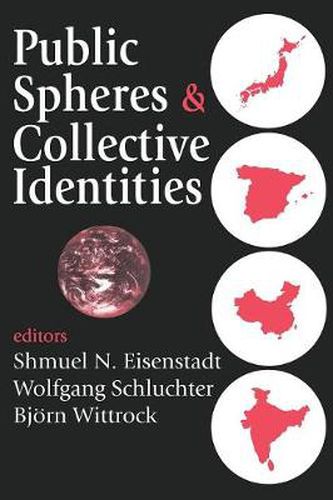Public Spheres and Collective Identities

Public Spheres and Collective Identities
Today it is assumed that we understand contemporary nationalism and nation-building. Researchers rarely consider the very different traditions from which such state-building emerged. Instead, there is almost too much discussion of the global village, with its supposed uniformity and inevitable trajectories. We need to view modernity as something other than a single condition with a preordained future. New visions of a modern civilization are emerging throughout the world, calliing for a far-reaching appraisal of the older visions of modernization.
Following Eisenstadt’s and Schluchter’s introduction, Bjrn Wittrock explores the varieties and transitions of early modern societies, noting that only by looking at societies’ collective identities and their modes of mediating in the public sphere can the distinguishing factors between modernity be appreciated. Sheldon Pollock discusses the use of vernacular language in India through its literary culture and polity, 1000-1500. Sanjay Subrahmanyam, sums up major developments in the recent historiography of South Asia from 1400 to 1750. David L. Howell focuses on the boundaries of the early modern Japanese state, including its political boundaries and the boundaries of collective identity and social status. Mary Elizabeth Berry examines public life in authoritarian Japan. Frederic Wakeman, Jr. probes the boundaries of the political game and how they were affected by the increased political centralization that developed after the disorder of the Ming-Qing transition during the seventeenth century. Alexander Woodside discusses territorial order and collective-identity tensions in Confucian Asia. Bernhard Giesen argues that the French Enlightenment can be described as an extension of absolutist court culture. Finally essay, Vctor Prez-Daz examines the state and public sphere in Spain during the Ancient Regime contrasting two ideal types of states–a nomocratic model and a teleocratic model.
This volume addresses cultural and political practices not only from outside the European and American spheres but also over long periods of time in which the internal dynamics of other civilizations become visible. Its broad-ranging use of empirical materials enables us to think comparatively and historically about the ways in which different modernities took shape.
Shmuel N. Eisenstadt is professor emeritus of sociology, The Hebrew University of Jerusalem.
Wolfgang Schluchter is professor of sociology, University of Heidelberg, and dean of the Max Weber Center for Cultural and Social Studies, University of Erfurt.
Bjrn Wittrock is Lars Hierta Professor of Government at Stockholm University and director and permanent fellow of the Swedish Collegium for Advanced Study in the Social Sciences (SCASSS) at Uppsala.
This item is not currently in-stock. It can be ordered online and is expected to ship in approx 2 weeks
Our stock data is updated periodically, and availability may change throughout the day for in-demand items. Please call the relevant shop for the most current stock information. Prices are subject to change without notice.
Sign in or become a Readings Member to add this title to a wishlist.


